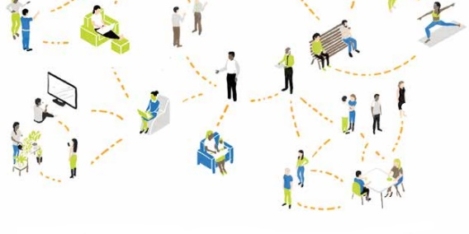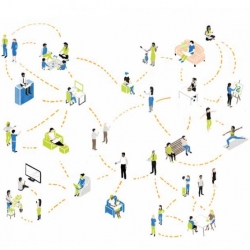March 30, 2021
New normal looking more and more like old normal, say facilities managers
 Workers across the UK could return to offices faster than anticipated, according to a new RICS survey of facilities managers. According to the poll, a growing number of respondents say that up to 80 percent of employees will head back once the pandemic is resolved. This is up from less than 60 percent expected in the same poll from the previous quarter ending November 2020. As evidence suggests the UK vaccination programme is taking hold across the country, results to the RICS UK Facilities Management Survey show more respondents starting to believe employees could return to the office in greater numbers than many initially expected in the previous quarter. More →
Workers across the UK could return to offices faster than anticipated, according to a new RICS survey of facilities managers. According to the poll, a growing number of respondents say that up to 80 percent of employees will head back once the pandemic is resolved. This is up from less than 60 percent expected in the same poll from the previous quarter ending November 2020. As evidence suggests the UK vaccination programme is taking hold across the country, results to the RICS UK Facilities Management Survey show more respondents starting to believe employees could return to the office in greater numbers than many initially expected in the previous quarter. More →






 As lockdown restrictions are eased and employees head back to the office a new report is calling for businesses to reinvent the world of work. The Human Organisation report highlights how the current workplace model is based on bureaucracy and hierarchy, which stifles employee empowerment and creativity.
As lockdown restrictions are eased and employees head back to the office a new report is calling for businesses to reinvent the world of work. The Human Organisation report highlights how the current workplace model is based on bureaucracy and hierarchy, which stifles employee empowerment and creativity. 
 More than six in ten UK managers have experienced burnout at work because of the COVID-19 pandemic, with a fifth considering quitting their job as a result, according to new research from
More than six in ten UK managers have experienced burnout at work because of the COVID-19 pandemic, with a fifth considering quitting their job as a result, according to new research from 
 A new report from KPMG suggests that half of major corporations do not expect to see a return to any sort of ‘normality’ until 2022 when half of the general population has been vaccinated. The report also claims that there has been a steep decline in the appetite of the global executives who took part in the survey for office downsizing as the firms reconsider the need for in-person business to resume when countries emerge from the pandemic.
A new report from KPMG suggests that half of major corporations do not expect to see a return to any sort of ‘normality’ until 2022 when half of the general population has been vaccinated. The report also claims that there has been a steep decline in the appetite of the global executives who took part in the survey for office downsizing as the firms reconsider the need for in-person business to resume when countries emerge from the pandemic. 
 Around a half (51 percent) of employees believe job security and flexibility (40 percent) are more important than salary (32 percent) when considering whether to remain at their current employer, according to a new report by UK law firm,
Around a half (51 percent) of employees believe job security and flexibility (40 percent) are more important than salary (32 percent) when considering whether to remain at their current employer, according to a new report by UK law firm, 
 The cost of poor company culture is a staggering £20.2 billion per year, according to research from HR software provider
The cost of poor company culture is a staggering £20.2 billion per year, according to research from HR software provider 
 One of the most significant consequences of the 2008 economic crash was a remarkable shift
One of the most significant consequences of the 2008 economic crash was a remarkable shift 
 The pandemic has certainly opened our eyes to the importance of constantly washing our hands, sterilising everything in sight and realising just how far germs can travel through the air, causing us to wince at the thought of a time where we huddled on public transport without masks. However, as we contemplate heading back to the office in the near future, businesses need to translate these learnings into workplace design and move indoor air quality to the top of the agenda.
The pandemic has certainly opened our eyes to the importance of constantly washing our hands, sterilising everything in sight and realising just how far germs can travel through the air, causing us to wince at the thought of a time where we huddled on public transport without masks. However, as we contemplate heading back to the office in the near future, businesses need to translate these learnings into workplace design and move indoor air quality to the top of the agenda. 
 New data from
New data from 
 Looking back, who could possibly have predicted 2020? It’s been such a difficult pandemic year for so many individuals and companies. Yet it’s also been a transformative time, which has seen dramatic shifts in the way we work. So, with some trepidation, here’s my forecast for the near future. This year will see the office bounce back, but not as we remember it. The office of the future will have an important new role as the physical embodiment of a changing corporate culture.
Looking back, who could possibly have predicted 2020? It’s been such a difficult pandemic year for so many individuals and companies. Yet it’s also been a transformative time, which has seen dramatic shifts in the way we work. So, with some trepidation, here’s my forecast for the near future. This year will see the office bounce back, but not as we remember it. The office of the future will have an important new role as the physical embodiment of a changing corporate culture. 
 Employees could save over £2,200 a year and ‘get back’ 98 mins a day if companies adopted a ‘Work Near Home’ model for offices in the future, claims research from workspace company,
Employees could save over £2,200 a year and ‘get back’ 98 mins a day if companies adopted a ‘Work Near Home’ model for offices in the future, claims research from workspace company, 









March 11, 2021
Body language still matters when you are working online
by Agata Nowakowska • Comment, Working culture